|
|
|
Sort Order |
|
|
|
Items / Page
|
|
|
|
|
|
|
| Srl | Item |
| 1 |
ID:
111594
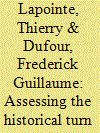

|
|
|
|
|
| Publication |
2012.
|
| Summary/Abstract |
This article reassesses what is at stake in the historical turn in international relations (IR) and the attendant debate between the Second Wave of neo-Weberian historical sociology (WHS) and Political Marxism (PM). Firstly, it endeavours to recast what is at stake in the 'historical turn' in IR: the critique of reification and chronocentrism. Secondly, it examines WHS's argument against reductionism in the light of Weber's own work. We show how the Weberian dualism between the politics and the economics inhibits its capacity to complete its project of historicizing IR. Finally, it explains why recent Weberian's defence of multicausalism creates even more obstacles on the road towards an ontologically consistent historical turn.
|
|
|
|
|
|
|
|
|
|
|
|
|
|
|
|
| 2 |
ID:
085394
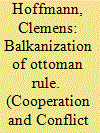

|
|
|
|
|
| Publication |
2008.
|
| Summary/Abstract |
The term `Balkanization' has found entry in the social sciences vocabulary as a metaphor for diversity at best, social and political instability for the most part, and genocidal war at worst. And yet it is precisely the emergence of a variety of national states and the Ottoman Empire's disintegration that are frequently portrayed as processes of `modernizing' as well as `naturalizing' the international system of the Balkans and the Middle East. By offering a historical sociological re-construction of early modern Ottoman history up to the Greek Revolt in 1821, I argue in this article that the national secessions were not synonymous with the creation of a `modern' international system in southeastern Europe
|
|
|
|
|
|
|
|
|
|
|
|
|
|
|
|
| 3 |
ID:
091433
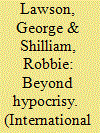

|
|
|
|
|
| Publication |
2009.
|
| Summary/Abstract |
It is no exaggeration to say that sovereignty is the foundation both of International Relations (IR) as a field of enquiry and of international politics as an 'actual existing' field of practice. Whether seen as the archetypal IR101 topic or in debates about the rights and wrongs of humanitarian intervention, the capacity of international organisations to exert control over significant spheres of international politics, or in discussions about the legitimacy of bodies such as the International Criminal Court, sovereignty appears as the central referent point of international politics. Over recent years, however, there has been considerable debate over both the substantive content ('fact') and normative framing ('value') of sovereignty. The former comes about as a result of a series of political, economic and security challenges which see states as assuming a role as 'one-amongst-many' in an increasingly complex international topography; the latter stems from concerns about whether national states form the optimal site for the articulation of authority claims. This forum engages with both of these debates, focusing on how they relate to understandings of the emergence, development and possible emasculation of sovereignty in the contemporary world. In the introduction to the forum, we outline the ways in which scholars have contested the emergence of the sovereign state and examine the ethical issues surrounding the normative value of this form of rule. In the process, we lay out the ways in which the papers that make up this forum make uncomfortable, if important, contributions to the debate about the fact and value - or 'is' and 'ought' - of sovereignty in contemporary world politics.
|
|
|
|
|
|
|
|
|
|
|
|
|
|
|
|
| 4 |
ID:
105932
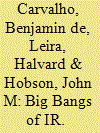

|
|
|
|
|
| Publication |
2011.
|
| Summary/Abstract |
International relations as we know them emerged through the peace of Westphalia, and the discipline of International Relations emerged in 1919 and developed through a First Great Debate between idealists and realists. These are the established myths of 1648 and 1919. In this article we demonstrate how historical and historiographical scholarship has demolished these myths, but that the myths regardless are pervasive in the current textbooks that are used in teaching future IR scholars. Disciplinary dialogue seems to have failed completely. Based on a detailed reading of the myths and their perpetuation, we discuss the consequences of the discipline's reliance on mythical origins, why there has been so little incorporation of revisionist insight and what possibilities there are for enhancing the dialogue.
|
|
|
|
|
|
|
|
|
|
|
|
|
|
|
|
| 5 |
ID:
158722
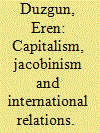

|
|
|
|
|
| Summary/Abstract |
Debates over ‘modernity’ have been central to the development of historical-sociological approaches to International Relations (IR). Within the bourgeoning subfield of International Historical Sociology (IHS), much work has been done to formulate a historically dynamic conception of international relations, which is then used to undermine unilinear conceptions of global modernity. Nevertheless, this article argues that IHS has not proceeded far enough in successfully remedying the problem of unilinearism. The problem remains that historical narratives, informed by IHS, tend to transhistoricise capitalism, which, in turn, obscures the generative nature of international relations, as well as the fundamental heterogeneity of diverging paths to modernity both within and beyond western Europe. Based on the theory of Uneven and Combined Development, Political Marxism, and Robbie Shilliam’s discussion of ‘Jacobinism’, this article first reinterprets the radical multilinearity of modernity within western Europe, and then utilises this reinterpretation to provide a new reading of the Ottoman path to modernity (1839–1918). Such a historical critique and reconstruction will highlight the significance of Jacobinism for a more accurate theorisation of the origin and development of the modern international order, hence contributing to a deeper understanding of the international relations of modernity.
|
|
|
|
|
|
|
|
|
|
|
|
|
|
|
|
| 6 |
ID:
155153
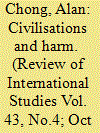

|
|
|
|
|
| Summary/Abstract |
Andrew Linklater’s Violence and Civilization in the Western States-System is to be both praised and critiqued for opening spaces for discussing civilisational standards in the era of a globalising world. It offers a healthy provocation for inquiry into how non-Western states ought to comprehend the legacies of Western political evolution colouring existing ‘IR’ as a discipline. Linklater’s book inspires three thematic reactions: globalisation does bring harm; the notion of a universal civilisation remains open to debate; and the possibilities of civilising patterns in premodern Southeast Asia serving as supplementary mirrors and extensions of the relationship between violence and civilisation. It is suggested that Linklater’s sequel must consider the trajectory of non-Western sociologies of IR.
|
|
|
|
|
|
|
|
|
|
|
|
|
|
|
|
| 7 |
ID:
113808
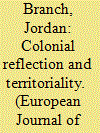

|
|
|
|
|
| Publication |
2012.
|
| Summary/Abstract |
The modern international system is commonly argued to have originated within Western Europe and spread globally during centuries of colonialism. This article argues, instead, that the character of the modern system of territorially sovereign states resulted from a complex interaction between European colonizing polities and events, actors, and spaces in other parts of the globe. In particular, through a process of colonial reflection, many of the foundational ideas and practices of modern statehood were formed in the interactions of Europeans with the unknown, supposedly empty, spaces of the New World in the 16th and 17th centuries. These novel practices were applied only later to politics among states in Europe. Most important among these developments is the ideal of territorial exclusivity as the sole basis for state sovereignty. This analysis also has implications for the study of contemporary international systemic change.
|
|
|
|
|
|
|
|
|
|
|
|
|
|
|
|
| 8 |
ID:
164981
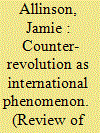

|
|
|
|
|
| Summary/Abstract |
This article argues that the case of the Egyptian 2011 revolution forces us to rethink accounts of counter-revolution in International Relations. The debate over whether the events of 2011–13 in Egypt should be considered a ‘revolution’ or merely a ‘revolt’ or ‘uprising’ reflects an understanding of revolutions as closed and discrete events, and therefore of international counter-revolution as significant only after revolutionary movements have seized sovereign power. Against this account, which maintains the idea of sovereignty as the boundary between domestic/social and international/ geopolitical phenomena, I argue that counter-revolutions can operate across boundaries during revolutionary situations before and to prevent revolutionary transformation and therefore affect whether a revolutionary sovereign power is established at all. Such counter-revolutions draw upon both the ideological inheritance of historical strategies of international ‘catch-up’, and the cross-border class relations that these different strategies bring into being. In the Egyptian case, the counter-revolution thus relied upon two factors deriving from this strategy: the ideological inheritance of Nasserism as a response to international hierarchy, and the integration of the post-Nasser Egyptian ruling elite with Gulf financial, and US security, networks.
|
|
|
|
|
|
|
|
|
|
|
|
|
|
|
|
| 9 |
ID:
155149
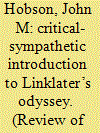

|
|
|
|
|
| Summary/Abstract |
This article provides an ‘engaged’ introduction to this forum on Andrew Linklater’s recently published book, Violence and Civilization in the Western States-Systems. I call this ‘engaged’ because I seek to adjudicate between the critics and Linklater’s book in the hope of building a bridge over troubled water. Given that the key word that underpins many of this forum’s contributions is Eurocentrism, I explore whether, and if so to what extent, Linklater’s book is Eurocentric. While I too identify various Eurocentric cues, I also provide various defences for Linklater. In particular, the final section advances two definitions of Eurocentrism and anti-Eurocentrism. Although I identify elements of ‘Eurocentrism I’ (the elision of non-Western agency and reification of the West) in his book, Linklater might respond to the principal forum complaint that he accords little or no role to non-Western actors and processes in the Western or global civilizing process by appealing to an alternative anti-Eurocentric approach: ‘anti-Eurocentrism II’ (which focuses squarely on Western imperial power and ignores or heavily downplays non-Western agency). I close by critiquing his left-liberal cosmopolitan politics, arguing that his Eurocentric-universalist normative posture cannot create the kind of peaceful and harmonious world that he (and Kant) so desires.
|
|
|
|
|
|
|
|
|
|
|
|
|
|
|
|
| 10 |
ID:
075325
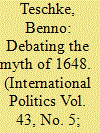

|
|
|
|
|
| Publication |
2006.
|
| Summary/Abstract |
This rejoinder restates and develops the central theses of 'The Myth of 1648: Class, Geopolitics and the Making of Modern International Relations' in relation to a set of objections raised from the perspective of IR Historical Sociology by Hendrik Spruyt, of Political and Social Theory by Roland Axtmann and of Political Geography by John Agnew. Most centrally, it re-affirms the charge of a defective historicisation and theorisation of 'Westphalia' in the discipline of International Relations, while suggesting that a Marxist perspective that emphasises the spatio-temporally differentiated and geopolitically mediated development of Europe is capable of providing a new long-term interpretive framework for the complex co-development of capitalism, state building and the interstate system. It thereby pleads for a paradigm-shift in IR Theory and IR Historical Sociology.
|
|
|
|
|
|
|
|
|
|
|
|
|
|
|
|
| 11 |
ID:
091435
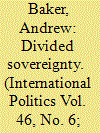

|
|
|
|
|
| Publication |
2009.
|
| Summary/Abstract |
Great Britain is regarded as a classic example of the Weberian state, and thus as a model of a developed state that might be contrasted with developing states. However, this view conceals the formative role of empire in the evolution of the British state. Rather than take the distinction between a 'metropolis' and a 'periphery' as given, this article explores the mutual constitution of state and empire. What it finds is that the political identity of the British state changed dramatically during the first half of the twentieth century as British intellectuals and policy-makers attempted to develop a new political community, primarily through the vehicle of the Commonwealth. The British state of the interwar years decentralised its decision making and embedded itself firmly in new multilateral networks. A rationalised, centralised British state emerged after the Second World War and only then within a context of multiple (principally Atlantic and European) political identities. The modern British state is as much a post-colonial invention as are states of the 'developing' world.
|
|
|
|
|
|
|
|
|
|
|
|
|
|
|
|
| 12 |
ID:
054345
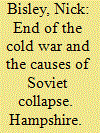

|
|
|
|
|
| Publication |
Houndmills, Palgrave Macmillan, 2004.
|
| Description |
viii, 209p.hbk
|
| Standard Number |
1403935785
|
|
|
|
|
|
|
|
|
|
|
|
Copies: C:1/I:0,R:0,Q:0
Circulation
| Accession# | | | | | | | | | | | |
| 048810 | 947.0854/BIS 048810 | Main | On Shelf | General | | | | | | | |
|
|
|
|
| 13 |
ID:
113805
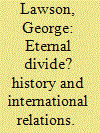

|
|
|
|
|
| Publication |
2012.
|
| Summary/Abstract |
On one level, history is used by all parts of the International Relations (IR) discipline. But lurking beneath the surface of IR's approach to history lies a well-entrenched binary. Whereas mainstream positions use history as a means to fill in their theoretical frames (seeing history as a kind of 'scripture' of abstract lessons), many post-positivists reduce history to a pick-and-mix of contingent hiccups (a 'butterfly' of what-ifs and maybes). Interestingly enough, this binary is one reproduced throughout the social sciences. As such, there is a bigger story to the apparently 'eternal divide' between history and social science than first meets the eye. This article uses the various ways in which history is used - and abused - in IR to probe more deeply into the relationship between history and social science as a whole. This exploration reveals four frameworks, two drawn from history (context and narrative) and two drawn from social science (eventfulness and ideal-typification) which illustrate the necessary co-implication of the two enterprises. The article employs these tools as a means of re-imagining the relationship between history and social science (including IR), conceiving this as a single intellectual journey in which both are permanently in view.
|
|
|
|
|
|
|
|
|
|
|
|
|
|
|
|
| 14 |
ID:
117914
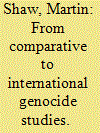

|
|
|
|
|
| Publication |
2012.
|
| Summary/Abstract |
Genocide is widely seen as a phenomenon of domestic politics, which becomes of international significance because it offends against international law. Hence there are as yet inadequate International Relations analyses of the production of genocide. This article challenges the idea of the domestic genesis of genocide, and critiques the corresponding approach of 'comparative genocide studies' which is dominant in the field. It analyses the emergence of more fruitful 'relational' and 'international' approaches in critical genocide studies, while identifying the limitations of their accounts of the 'international system'. As first steps towards an adequate international account, the article then explores questions of the international meaning and construction of genocidal relations, and of international relations as the context of genocide. It argues for a historical and sociological approach to the international relations of genocide, and examines 20th-century European genocide in this light. Arguing for a broader conception of this historical experience than is suggested by an exclusive focus on the Holocaust, the article offers an interpretation of genocide as increasingly endemic and systemic in international relations in the first half of the century. It concludes by arguing that this account offers a starting point, but not a model, for analyses of genocide in global international relations in the 21st century.
|
|
|
|
|
|
|
|
|
|
|
|
|
|
|
|
| 15 |
ID:
097730
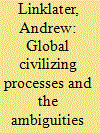

|
|
|
|
|
| Publication |
2010.
|
| Summary/Abstract |
Increased social power over the millennia has led to remarkable achievements in varied spheres of endeavour while introducing new possibilities for more destructive forms of harm over greater distances. Efforts to create moral frameworks to protect persons from senseless harm have been critical replies to the ambiguities of human interconnectedness. Over the millennia, societies have become entangled in global 'civilizing processes' such as the systems of communication that now encompass humanity as a whole, enabling different peoples to become better attuned to each other. Societies of states have immense significance for that long-term development. They have been arenas in which independent communities have discovered the prospects for, as well as the constraints on, agreements on norms that can be anchored in the most readily available points of solidarity between strangers - those vulnerabilities to mental and physical suffering that are shared by human beings everywhere. The recovery of 'universal history from a cosmopolitan point of view' can examine the contribution that international societies have made to global civilizing processes that harness such solidarities to restrain the human capacity to cause violent and non-violent harm to distant peoples. It can support the normative project of promoting global civilizing processes that employ unprecedented levels of collective power to reduce the tragic effects of the ambiguities that have accompanied long-term trends towards higher levels of human interconnectedness.
|
|
|
|
|
|
|
|
|
|
|
|
|
|
|
|
| 16 |
ID:
077892
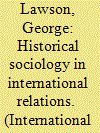

|
|
|
|
|
| Publication |
2007.
|
| Summary/Abstract |
Over the last 20 years, historical sociology has become an increasingly conspicuous part of the broader field of International Relations (IR) theory, with advocates making a series of interventions in subjects as diverse as the origins and varieties of international systems over time and place, to work on the co-constitutive relationship between the international realm and state-society relations in the processes of radical change. However, even as historical sociology in IR (HSIR) has produced substantial gains, so there has also been a concomitant watering down of the underlying approach itself. As a result, it is no longer clear what exactly HSIR entails: should it be seen as operating within the existing pool of available theories or as an attempt to reconvene the discipline on new foundations? This article sets out an identifiable set of assumptions and precepts for HSIR based on deep ontological realism, epistemological relationism, a methodological free range, and an overt normative engagement with the events and processes that make up contemporary world politics. As such, HSIR can be seen as operating as an open society, a research programme and a vocation
|
|
|
|
|
|
|
|
|
|
|
|
|
|
|
|
| 17 |
ID:
077893
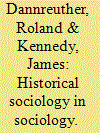

|
|
|
|
|
| Publication |
2007.
|
| Summary/Abstract |
While historical sociology (HS) has declined in the UK, its position in the United States is much more secure. This article analyses the divergent paths of HS in both the UK and the US in order to provide some lessons for international relations (IR) in both countries. The article argues that HS in the US has been more successful in defining its particular contribution - the pursuit of important, macro-oriented research. The main benefit that HS can bring to IR is the provision of this 'intellectual space' allied to an engagement with 'big issues'. The article traces such a contribution in three areas: the state, civil society and democratization; nationalism and ethnic conflict; and Islam and the Middle East. The article concludes by arguing that the adoption of HS may have the added benefit of transcending the exigencies of the present-day and the parochialism of Western and Eurocentric concerns found in much contemporary IR
|
|
|
|
|
|
|
|
|
|
|
|
|
|
|
|
| 18 |
ID:
045944
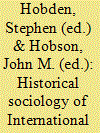

|
|
|
|
|
| Publication |
Cambridge, Cambridge University Press, 2002.
|
| Description |
xi, 315p.
|
| Standard Number |
0521004764
|
|
|
|
|
|
|
|
|
|
|
|
Copies: C:1/I:0,R:0,Q:0
Circulation
| Accession# | | | | | | | | | | | |
| 046948 | 327/HIS 046948 | Main | On Shelf | General | | | | | | | |
|
|
|
|
| 19 |
ID:
094559
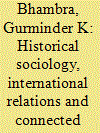

|
|
|
|
|
| Publication |
2010.
|
| Summary/Abstract |
This article addresses three recent developments in historical sociology: (1) neo-Weberian historical sociology within International Relations; (2) the 'civilizational analysis' approach utilized by scholars of 'multiple modernities'; and (3) the 'third wave' cultural turn in US historical sociology. These developments are responses to problems identified within earlier forms of historical sociology, but it is suggested each fails to resolve them precisely because each remains contained within the methodological framework of historical sociology as initially conceived. It is argued that their common problem lies in the utilization of 'ideal types' as the basis for sociohistorical analysis. This necessarily has the effect of abstracting a set of particular relations from their wider connections and has the further effect of suggesting sui generis endogenous processes as integral to these relations. In this way, each of the three developments continues the Eurocentrism typical of earlier approaches. The article concludes with a call for 'connected histories' to provide a more adequate methodological and substantive basis for an historical sociology appropriate to calls for a properly global historical sociology.
|
|
|
|
|
|
|
|
|
|
|
|
|
|
|
|
| 20 |
ID:
189985
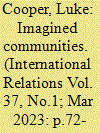

|
|
|
|
|
| Summary/Abstract |
Drawing on the concept of uneven and combined development this article critically interrogates Benedict Anderson’s theory of the ‘imagined community’ through an historical investigation into the English-realm-cum-British-empire. Placing its rise in the context of the conflicts of Post-Reformation Europe, it identifies vectors of combined development (money, goods, ideas, people) which shaped the formation of new imagined communities. These post-Reformation struggles were not defined by nationality but subjecthood, which saw ‘the realm’ displace the monarch as an object of rights and duties. The 18th century rise of British nationalism was a response to the long crisis of subjecthood (1639–1688). However, this emergence was uneven and non-linear, such that it co-existed as a political imagination with continued belief in – and political support for – subjecthood. Ironically, given its latter-day mythology, the American Revolutionary War was fought to protect subjecthood under the Crown from subordination to the British nation and its parliament.
|
|
|
|
|
|
|
|
|
|
|
|
|
|
|
|
|
|
|
|
|